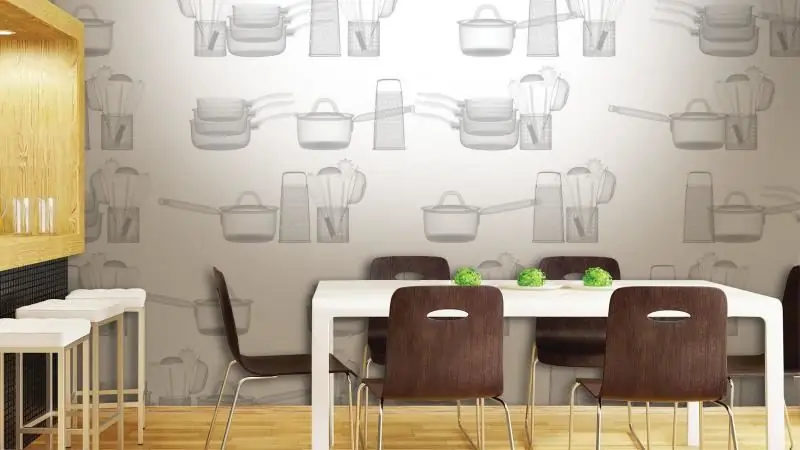
Table of contents:
- Author Bailey Albertson albertson@usefultipsdiy.com.
- Public 2024-01-17 22:26.
- Last modified 2025-01-23 12:41.
How to choose vinyl wallpaper for your kitchen and decorate your space with style

Kitchen wall decoration must withstand temperature extremes, high humidity and be resistant to dirt. These requirements are met by vinyl wallpaper, which is one of the most popular materials for decorating kitchen walls. Compliance with the selection rules will allow you to create a cozy interior in the room.
Content
-
1 Features of kitchen wall decoration with vinyl wallpaper
- 1.1 Pros and cons of vinyl wallpaper in a kitchen setting
- 1.2 Varieties of vinyl wallpaper
- 1.3 What to consider when choosing vinyl wallpaper for the kitchen
-
2 How to decorate walls with vinyl wallpaper
- 2.1 Video: the stages of gluing wallpaper on the walls
- 2.2 Caring for vinyl wallpaper in the kitchen
- 3 Photo gallery: vinyl wallpaper in kitchen design
Features of decorating kitchen walls with vinyl wallpaper
Vinyl wallpaper is a roll of finishing material, consisting of two layers. The bottom layer can be paper, fabric or non-woven. The upper one is made of polyvinyl chloride, which is a durable material, which is often decorated with textured embossing or pattern. As a result of this combination, a strong and durable material is obtained for finishing the walls of the kitchen and other rooms with high humidity, temperature extremes.

Vinyl wallpaper can be of any color, but it should harmoniously complement the interior of the kitchen
Pros and cons of vinyl wallpaper in a kitchen setting
Vinyl wallpapers are varied in appearance, characteristics, sizes, but all options have common advantages:
- dense structure that allows you to hide minor wall defects;
- the possibility of easy wet cleaning of walls to remove light dirt;
- a variety of types of wallpaper that can be used in the kitchen;
- resistance to light mechanical stress, moisture, grease;
- the possibility of combination with other finishing materials for walls.

Vinyl wallpaper can be lightly damp cleaned
Of the disadvantages of wallpaper for the walls of the kitchen, the following should be considered:
- the coating absorbs odor;
- not suitable for very uneven walls;
- quickly get dirty in the working area;
- fade when exposed to direct sunlight.
Varieties of vinyl wallpaper
For finishing the walls of the kitchen, you can choose the best type of wallpaper among the common options. The following types of vinyl sheets are distinguished:
-
structural vinyl is characterized by a rough and embossed surface, decorated with patterns and three-dimensional ornaments. It is such a coating that allows you to hide defects on the walls. Structural vinyl can have a paper or non-woven backing. The coating does not withstand mechanical stress, cleaning with cleaning agents, impacts. This finish is best suited for the dining area, because in the work area, this wallpaper is impractical;

Textured Light Patterned Vinyl Wallpaper It is easy to hide slight unevenness in the walls with textured wallpaper
-
paintable vinyl wallpaper is a practical solution for the kitchen. The canvases are resistant to humidity and temperature extremes, they can have a relief pattern, but are always made in a single color, as a rule, in a white shade. They are easy to paint with acrylics for interior use. The color can also be easily changed by recoloring the wallpaper. This allows you to update the wall decoration without much time and money for kitchen renovation. In this case, the coating should not be exposed to blows, exposure to sharp objects, since the margin of safety of the wallpaper for painting is small;

Roller painting vinyl wallpaper Wallpaper can be painted with a roller or wide brush
-
compact vinyl is a covering that imitates fabric, stone and other materials. Such a structure is obtained by hot pressing of PVC. Wallpaper can be treated with a soft brush, damp cloth, and the coating is resistant to moisture and scratches. Such wallpapers are characterized by durability;

Bluish compact vinyl Compact vinyl is suitable for the kitchen due to its durability
-
kitchen vinyl is an ideal solution for a kitchen in a private house or apartment. This type of wallpaper can be washed with a sponge and non-abrasive cleaning agents. The roll material is very thick and dense. You can glue the kitchen vinyl over both the wall of the dining area and the apron. Manufacturers produce a variety of coating options with different patterns;

Bright Kitchen Vinyl Wallpaper Kitchen vinyl wallpaper can be damp cleaned
-
silk-screen printing is distinguished by a light sheen and texture reminiscent of silk. The material is obtained by hot pressing vinylized paper, which is subjected to a special dyeing technique. Such a coating does not have volumetric patterns, but it has a luxurious appearance. It is not necessary to glue silk-screen printing near the work area or plate, as due to soot and grease, the wallpaper will quickly lose its graceful shine;

Wallpaper silkscreen in the kitchen Light shine gives the kitchen interior a luxurious look
-
hard vinyl is based on three paper layers, and the top vinyl is resistant to fading, mechanical damage, moisture. When glued to walls, the coating does not stretch, and the appearance of the material can imitate stone, plaster and other textures. These wallpapers are available in different colors and sizes.

Beige Vinyl Wallpaper for Kitchen For the kitchen, you can choose both laconic and luxurious wallpapers.
What to consider when choosing vinyl wallpaper for the kitchen
Vinyl wallpapers are available in a range of wallpapers from different manufacturers. It is important to choose the right finishing material for the kitchen, and for this, take into account the following:
- the texture of the wallpaper should not be too porous, because in this case the material will absorb grease, and it will be difficult to remove dust from the surface of the walls. Smooth smooth or slightly embossed wallpaper will be a good solution for a kitchen of any size;
- the width of a roll of wallpaper can be 50, 75 and 100 cm. If the kitchen has long walls, then the canvases with a width of 75 or 100 cm allow you to quickly carry out repairs. In the case when the walls are small, it is best to use rolls of 0.5 meters;
- for walls with small defects, thick wallpapers are best suited, which well hide surface imperfections. Thin canvases are appropriate for smooth walls;
- the color of the wallpaper is selected depending on the general interior of the room. It should be borne in mind that bright furniture looks best against the background of beige, white, gray and other light wallpapers. Bright walls combined with pale furniture will be a good accent in the setting;
- on plain wallpaper, even the slightest dirt becomes quickly noticeable and therefore the printed coating is more practical for the kitchen;
- wallpaper should be purchased with a margin, having previously measured the height and width of the walls. The width should be divided by the roll size by calculating the number of strips. Then the length of the roll is divided by the resulting number of strips, determining how long one roll will last. Thus, the number of wallpaper packs is counted, taking into account a small stock of 1 - 2 strips.
How to decorate walls with vinyl wallpaper
Before gluing vinyl sheets, you need to choose an adhesive designed specifically for this material. Manufacturers indicate on the packaging the number of rolls and other information that helps determine the required amount of glue. And it is also worth preparing a roller with a pile, a wide brush, a container for diluting the glue. Cutting wallpaper sheets is easy with a utility knife with replaceable blades.
After preparing the tools, you can start working:
-
The wall is treated with a primer for interior work before finishing. The composition is applied with a brush or roller in 2 - 3 layers, waiting for each previous one to dry.

Wall priming with a roller The fastest application of the primer is with a roller
-
Next, the required length of the strips is measured, which is often 5 - 7 cm more than the height of the walls. On the unwound roll, measure the resulting indicator, draw an even line and cut the strips. The sheets are glued end-to-end, making an overlap of 2 - 3 cm on the ceiling and floor. Start work from the door or from the window. In this case, the glue is applied only to the canvases if the walls were previously well primed. Otherwise, the surface and wallpaper are treated with glue. It is important to grease the edges of vinyl sheets especially well with the compound.

Applying glue with a brush to wallpaper Adhesive on wallpaper and wall can be applied by brush or roller
-
When gluing, the canvas is smoothed with a plastic spatula, brush or rubber roller, with which it is easy to remove air bubbles. Begin to smooth each strip from the top and from the middle to the edges.

Smoothing wallpaper on the wall When gluing, it is important to carefully remove air bubbles
-
Above window or door openings, measure the distance from the ceiling to the edge of the opening, add 5 - 7 cm for overlap, cut pieces of the required length and glue them to the wall. After the wallpaper dries in the kitchen with a clerical knife, carefully cut off the overlaps on the ceiling and floor that were made during gluing.

Removing wallpaper overlap in the window area You can use a spatula to cut the wallpaper evenly.
Video: the stages of gluing wallpaper on the walls
Caring for vinyl wallpaper in the kitchen
To maintain the original appearance of the wall decoration, it is necessary to take care of the wallpaper. To do this, you should use the following recommendations:
- any splashes and stains that appear are best removed with a damp cloth. If the wallpaper is washable, then you can use a sponge, dishwashing detergent;
- peeling joints can be carefully corrected by smearing them with a brush with glue and carefully smoothing them;
- if the wallpaper is glued in the apron area, then it can be protected from dirt with a glass transparent panel, which is screwed to the wall;
- dry cleaning is carried out with a vacuum cleaner or a soft brush, removing dust from the surface of the wallpaper;
- fresh grease stains can be removed by ironing the dirty wallpaper through a sheet of white paper.
Photo gallery: vinyl wallpaper in kitchen design
-

Lilac vinyl wallpaper in the kitchen dining area - The dining area can be visually separated with bright wallpaper
-

Separating the kitchen from the dining room with a partition with vinyl wallpaper - In a large kitchen, several functional areas can be organized
-

Vinyl wallpaper in the dining area and bar in the kitchen - Beige helps to create a cozy atmosphere
-

The combination of vinyl wallpaper with different patterns in the kitchen - In the interior, you can combine wallpaper with different patterns
-

Colorful vinyl wallpaper and gray furniture in the kitchen - Bright wallpapers on the walls make the atmosphere cozy and cheerful
-

Dark vinyl wallpaper in the kitchen with brown furniture - Wood furnishings and floral prints accentuate country and rustic interiors
-

Light Vinyl Printed Wallpaper in Kitchen Dining Area with White Furniture - A gray or light brown floor covering is suitable for light-colored wallpaper and furniture.
-

Pale vinyl wallpaper in the backsplash area in the kitchen - Washable wallpaper should be used in the apron area.
-

Bright kitchen with spectacular vinyl wallpaper - The wall near the dining area should be highlighted with bright wallpaper.
-

Multicolored vinyl wallpaper in the apron area in the kitchen - An apron is easy to make a bright detail of the kitchen decor using wallpaper.
-

Blue vinyl wallpaper in a bright kitchen - Several bright colors can be used in the interior of the kitchen.
-

Vinyl dark wallpaper in the kitchen with a partition - It is easy to combine wallpaper with different patterns in the setting
-

The combination of bright vinyl wallpaper and textiles in the kitchen - Wallpaper and textiles can be made the main details of the decor
-

Small kitchen with vinyl wallpaper and an unusual chandelier - An original chandelier can be made by hand and made to order
-

Wall decoration of the dining area with light vinyl wallpaper - The dining area can be highlighted with wallpaper of any color.
-

Wallpaper with imitation brick - If in the kitchen you want to make a brick wall, but you are worried about the soiling of the material, use vinyl brick wallpaper
-

Wallpaper with texture - Various textured wallpapers work well for the dining area in the kitchen.
-

Wallpaper with ornament in the kitchen - Wallpaper with an interesting ornament is suitable for a bright kitchen.
-

Dark wallpaper in a small kitchen - Wallpaper with a bold pattern can be placed further away from the hob to keep it bright
-

Wallpaper in the green kitchen - If wallpaper of dusty colors is used in the kitchen, you can complement them with bright accents-accessories to match
-

Wallpaper in the blue kitchen - Furniture can go well with wallpaper colors
Vinyl wallpaper is a practical solution for kitchen wall decoration. This coating is available in different versions and can be easily cleaned. A wide variety of colors allows you to create a unique kitchen interior and therefore vinyl covering is in demand for walls.
Recommended:
Liquid Wallpaper In The Kitchen: Characteristics And Features, Advantages And Disadvantages, Photos Of Bright Ideas
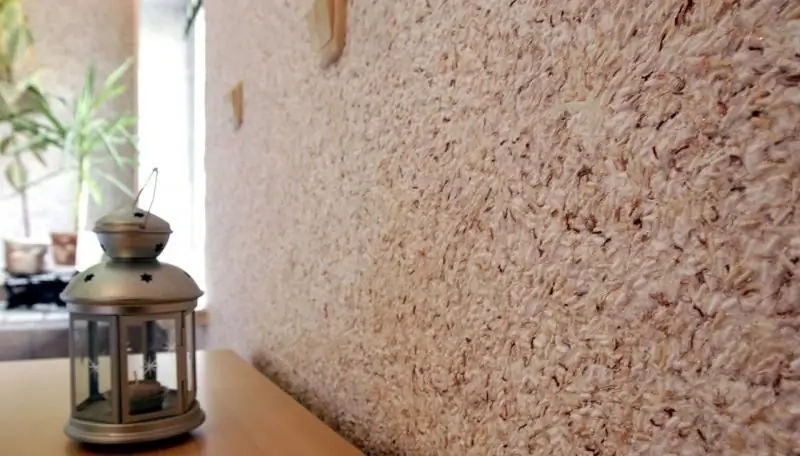
Features of the use of liquid wallpaper, their pros and cons, selection options. How to properly apply liquid wallpaper on the walls, create a drawing and decorate the kitchen
Venetian Plaster In The Kitchen: Features, Advantages And Disadvantages, Application To Walls, Design Options, Photo

What is Venetian plaster, its advantages and disadvantages. How to choose the right material and tools for its application. Finishing steps and wall design
Kitchen With Patina On The Kitchen Set And Furniture: What It Is, Interior Design Features, Photo
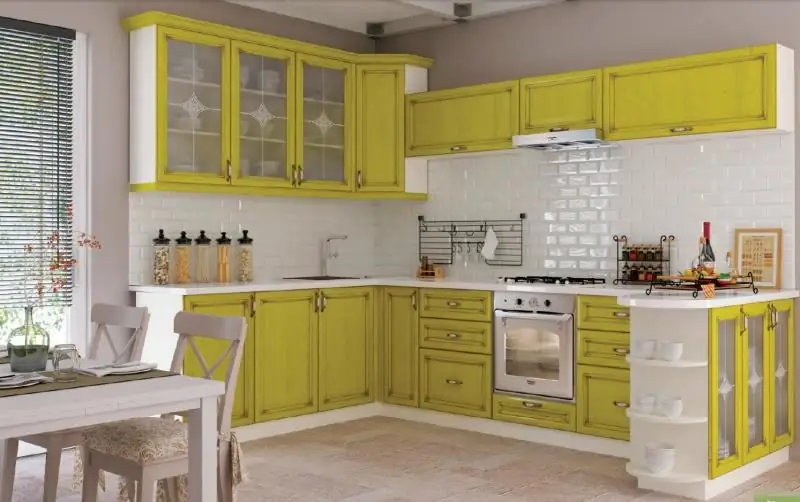
What is patina. Advantages and disadvantages of patination. Kitchen design with patina: colors, styles and interior features
Wallpaper In Modern Kitchen Design 2019, Interior Design Options, Photo Ideas
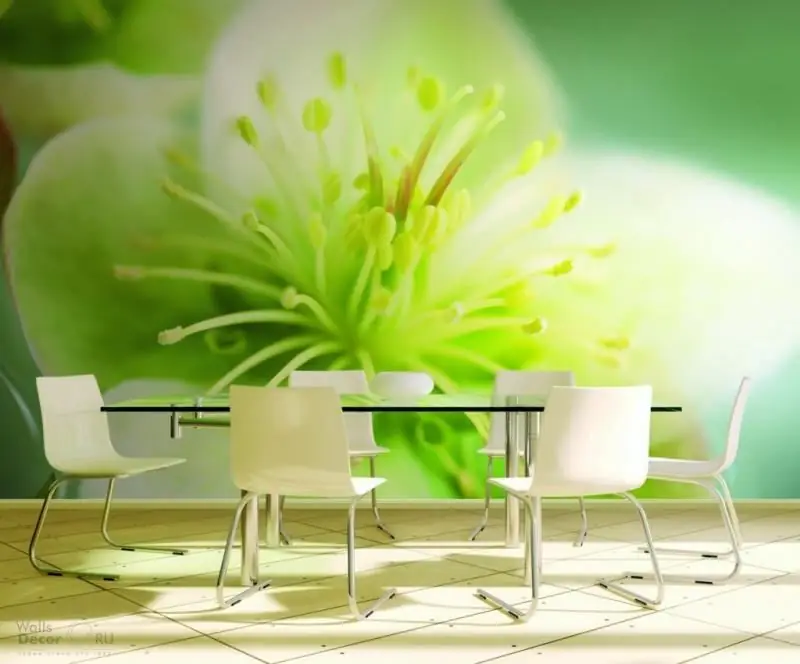
Pros and cons of photo wallpaper for the kitchen. What material is right. Recommendations for selection and gluing. Interesting kitchen design ideas. Reviews
Photo Wallpaper For The Kitchen, Expanding The Space: Characteristics, Advantages And Disadvantages, Photos Of Interesting Solutions
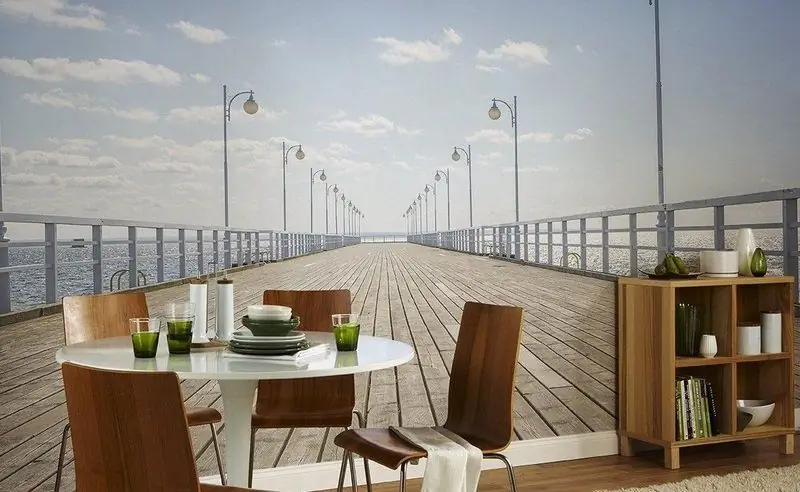
Voluminous wallpaper for the kitchen, their varieties, pros and cons. How to choose a subject, color scheme. Recommendations for gluing and care. Design options
